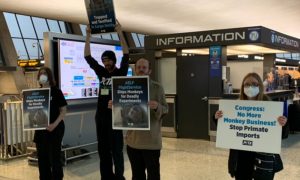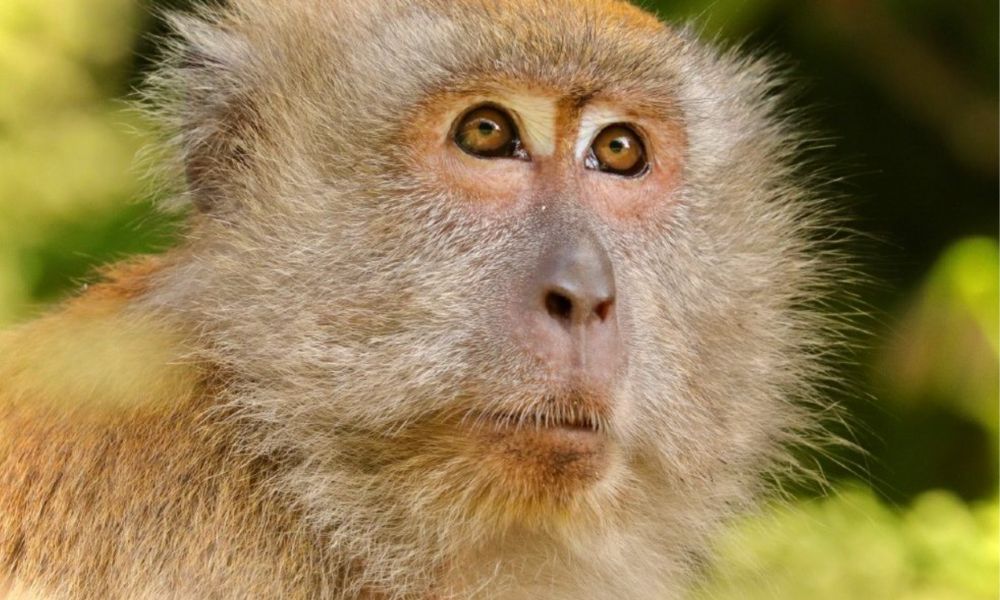More than 1,000 young macaques who may have been illegally captured from their wild homes in Cambodia and then shipped to a U.S. laboratory must go to a reputable sanctuary, rather than be shipped back, according to numerous groups advocating for the animals’ safe release.
The U.S. Department of Justice (DOJ) in November 2022 indicted eight individuals — including two top Cambodian forestry and wildlife officials — for trafficking up to 3,000 wild monkeys whom they passed off as “captive bred.”
This year, the DOJ subpoenaed Texas-based Charles River Laboratories — a company that buys, sells, and conducts testing on animals for biomedical “research” — with news reporting that up to 1,000 of the juvenile long-tailed macaques at the company’s primate center in Houston may have been illegally caught in the wild.
A spokesperson told news that Charles River Laboratories is “steadfastly opposed to the illegal importation of non-human primates,” the company is fully cooperating with the DOJ investigation, and that the allegations against the company are “without merit.”
Animal welfare groups Born Free USA and People for the Ethical Treatment of Animals (PETA) have been advocating for a release of the primates to a reputable sanctuary.
The groups also have been urging the U.S. Fish and Wildlife Service (FWS) — the federal agency tasked with ensuring wild-caught macaques aren’t imported into the United States, in violation of CITES law — to prohibit the return of the macaques to Cambodia.
“The monkeys’ future if they are shipped back to Cambodia has no happy ending,” said Born Free’s Liz Tyson. “Sanctuary in the US is the only way to guarantee their safety.”
In December, PETA held protests outside of Dulles International Airport, a reported waypoint for macaques from Vietnam and Cambodia on their way to Charles River Laboratories. Then, in March, PETA stationed protestors around the Houston-based laboratory. The activists reportedly thwarted plans to transfer the macaques back to Cambodia. Thousands of animal advocates also called and emailed the FWS urging for the macaques’ release to a sanctuary, PETA said.
“The ill-conceived era of relying on stolen, diseased, distressed monkeys to cure human disease has never worked and is coming to an end, hopefully in time for these species to recover in their natural habitats,” said Lisa Jones-Engel, PETA’s primate expert.

PETA protests inside Dulles International airport (PETA)
This year, the International Union for the Conservation of Nature (IUCN) uplisted long-tailed macaques’ status from “threatened” to “endangered” given their severe exploitation by the biomedical research industry.
The United States reportedly imports nearly 30,000 long-tailed macaques each year for cruel testing, with about 60 percent of the primates coming from Cambodia.
PETA reportedly has pledged $1 million for the macaques’ safe placement at a sanctuary and is calling for the laboratory’s import permit to be revoked, and for the lab to pay relocation costs for the macaques, should the government investigation find that Charles River Laboratories accepted wild-caught, trafficked macaques.
Born Free USA said they have repeatedly asked for a meeting with Charles River Laboratories, noting that the laboratory’s cooperation could quickly ensure a lifetime of safety for these macaques. But the organization has not had any response to date, Tyson said in an online post.
Born Free USA also has asked government authorities to be allowed to rescue just two of the macaques to clarify the legal process of transferring them from the laboratory. That request also has been ignored, Tyson said.
“The government departments we are working with continue to refuse to give us the most basic information that might help us in our efforts,” she wrote. “[But] This fight is not over, and we remain hopeful that we can rescue at least some of these monkeys. Our dream is to be able to rescue all of them.”
An FWS spokesperson did not comment on the specifics of the macaques but told Lady Freethinker via email that the agency is committed to upholding its CITES obligations.
“This includes not allowing wild caught macaques to be illegally imported or exported into or out of the United States in violation of the Treaty,” the spokesperson said. “As part of our treaty obligations we will continue to use the many tools available to us to evaluate the legality of non human primate imports or exports into or out of the US on a case-by-case basis.”
TAKE ACTION
Born Free is asking people to politely contact Charles River Laboratories and ask that the company meet with the animal advocates to come to a humane solution for these exploited macaques. If you’d like to help take action (from Born Free’s website):
Contact Charles River Laboratories and ask them to meet with Born Free USA as a matter of urgency! Call the lab at (781) 222-6000 or send an email to [email protected]. Below is a sample message you can use and modify to express your concern for the monkeys.
“I am calling upon Charles River Laboratories to do the right thing by the 1,000+ juvenile long-tailed macaques held by them and to work with the government to facilitate their relinquishment to sanctuary care. Charles River claims that it was unaware that the monkeys in question may have been captured illegally from the wild. The International Union for the Conservation of Nature recently announced that this species of monkey is now endangered, in large part because of their removal from the wild for use in primate experimentation. This is Charles River Laboratories’ opportunity to put things right. If the monkeys are returned to Cambodia, these endangered animals are likely to be recycled into the same smuggling ring through which they entered the U.S. Charles River has the resources to guarantee the lifelong care of these monkeys and has a unique opportunity to provide restitution for the harm that has already been caused. PETA and Born Free USA are standing ready to meet with you to find a way forward for these monkeys.”







